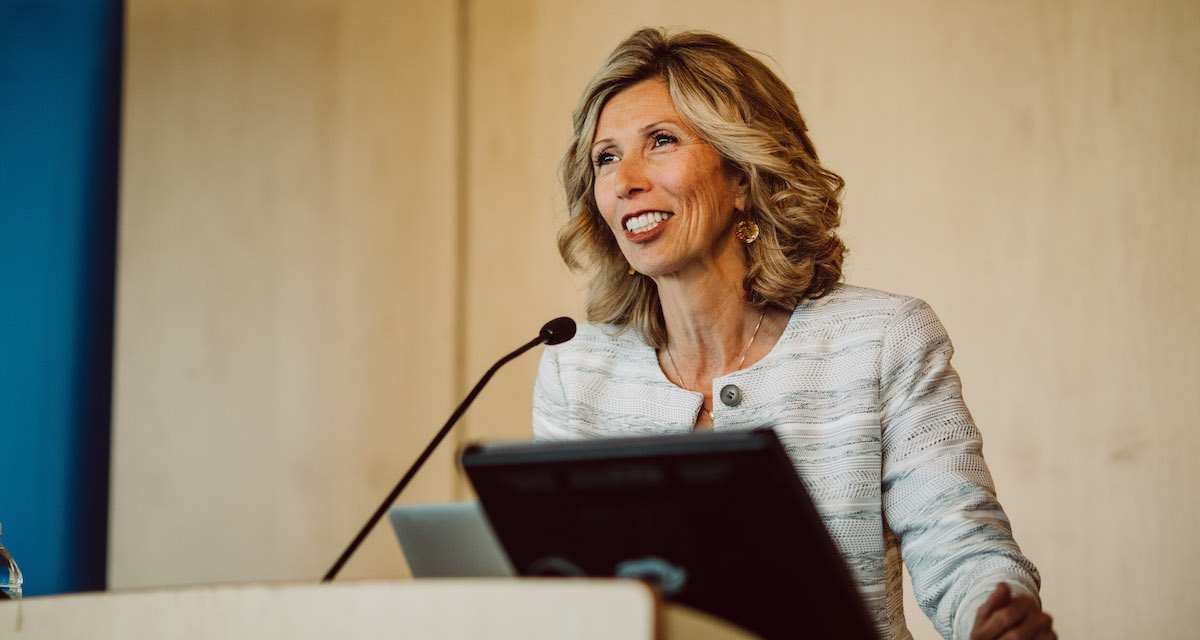Symposium Speaker Finds Hope Amidst Greek Refugee Crisis
In 2004, Greece hosted the Olympic games under the banner, “Welcome Home.” The city spent billions of dollars on the event and filled Athens with performers dressed as ancient Greeks. According to Dr. Christine Palmer, Greek expat and lecturer at Gordon-Conwell Theological Seminary, it was the perfect example of the country’s deep-rooted pride. “This who we are, as a people,” said Palmer. “We were frozen in time, dressed in the glory of a golden age.” It was a drastically different scene from what was to come a decade later in the Greek refugee crisis.
Earlier this month, Palmer gave the Richard Gross Keynote Address at the 2019 Symposium, hosted by the Center for Faith and Inquiry (CFI). With a focus on “Christianity in the Majority World,” events throughout the day encouraged the Gordon community to think about global ministry. In Palmer’s address, “With a Mighty Hand: God’s Work Among Refugees in Greece,” she spoke from personal experience, born and raised in Greece, to describe the impacts of the Greek refugee crisis and where Christianity fits in.
“Just over a year ago, the top issue related to justice in the world on social media was the Greek refugee crisis, and now we hardly hear a thing about it,” said CFI Director William Barker. “It’s as if the crisis is over, but it’s not.”
In 2015, a wave of refugees from Ghana, Syria, Somalia, Iraq, Iran and many other countries began pouring into the country. In the midst of overcrowded camps, refugee assimilation and high unemployment across the country, Palmer said, “human suffering was turned to profit.” Turkish smugglers made millions of dollars each day by sailing refugees to Greece on overcrowded boats—many of which intentionally failed if they were at risk of being caught.
“The global tectonic plates were shifting, and we found ourselves at the crossroads of an unprecedented global migration,” she said.
“Because of all of this, the brightest in our country are leaving a land that’s embedded in their DNA,” says Palmer. “It’s overwhelming for the refugees, but it’s also overwhelming for those who are trying to take care of them.” Palmer said that upscale and historic neighborhoods in Athens have become “showcases of despair”—“The birthplace of democracy has been given over to anarchists.”
In the midst of suffering, however, “the story intersects with a more lasting narrative: the narrative of the Kingdom.” From Muslim refugees listening to the story of Christ and being baptized, to Christians donating blood when hospitals fell short, to young pastors evangelizing to anarchists through graffiti, Palmer gave many examples of ways that Christians are reaching out to provide hope during the crisis. “This is a victory for the Lord and a victory for the Kingdom,” she said.
“Often times we are so concerned with how to communicate the right doctrine, but the most important doctrine has been the love of God,” she said. “There’s no better way for people to see this than through God’s people, putting on display who the Lord is.” Although Palmer has been raised in a culture most proud to be Greek, she is “prouder to be a Christian.”
Greece’s identity has greatly evolved over the past several years. “We’re no longer dressing as gods, but we’re clothing ourselves in humility as we try to reach out for the sake of the Lord. We are finding a truer identity in Christ.”
Concluding her address, Palmer encouraged her audience to travel to other countries to “model the kind of love of the one who offered himself for us” through mission work. She also challenged the College to continue praying for peace in Greece and the rest of the world. “You can’t predict how the Lord will use your hands,” she said, “but know that he will, and he wants to. We find a truer identity in Christ together, with our displaced brothers and sisters from all over the world.”
By Ellian Chalfant ’22, communication arts and Spanish
 The Bell
The Bell